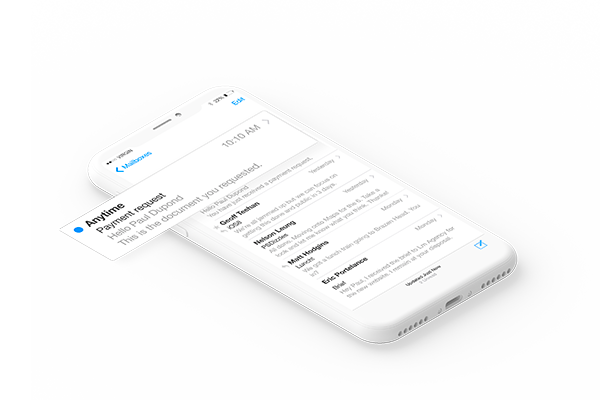Lorsque l’on débute avec les notes de frais, on peut facilement se retrouver désorienté. Le processus de gestion des notes de frais étant particulièrement complexe, il est parfois difficile de répondre à toutes les obligations. S’agissant d’obligations légales, ne pas y répondre peut compromettre le remboursement de vos frais. Retrouvez ici 10 règles incontournables pour vous faire rembourser vos frais professionnels.

Anticiper les frais
La première chose à prendre en compte lorsque l’on vous parle de note de frais est de prendre conscience que c’est à vous d’avancer les dépenses. Si vous devez effectuer un déplacement professionnel de plusieurs jours ou organiser un repas d’entreprise avec de nombreux convives, veillez donc à anticiper les frais à engager pour être sûr d’avoir les ressources nécessaires.
Si vous estimez que les frais à avancer sont trop importants compte tenu de vos revenus, vous pouvez demander une avance sur frais professionnels. Elle ne couvrira peut-être pas l’intégralité des dépenses, mais cela vous évitera d’avoir à trop puiser dans vos ressources personnelles.
Collecter les justificatifs
En matière de notes de frais, s’il y a bien une chose à garder en tête c’est le fait que les justificatifs d’achats sont indispensables. Dans le cadre d’un déplacement pro, vous devrez donc veiller à bien les conserver. À noter qu’il est important que le détail des dépenses figure sur le document, sans quoi votre entreprise pourra vous refuser le remboursement de votre note de frais.
Être organisé
Si vous partez en déplacement pour une journée, vous n’aurez sans doute pas de difficultés à gérer vos justificatifs. En revanche, s’il s’agit d’un voyage d’affaires de plusieurs jours, avec des frais de déplacement, d’hébergement, de repas ou toute autre dépense à déclarer à votre retour, vous pouvez rapidement vous y perdre. C’est pourquoi il est indispensable de conserver tous vos justificatifs dans une pochette, un classeur ou même une boîte. Pour plus d’efficacité au moment de remplir vos notes de frais, l’idéal est même de les classer par type de dépense.
Numériser les justificatifs
Les nouvelles technologies ont également leur place dans la procédure de gestion des notes de frais. Pour éviter les justificatifs égarés ou effacés, les numériser à l’aide d’un scanner est une excellente option. Vous pouvez aussi les prendre en photo à l’aide de votre téléphone portable, l’essentiel étant que les informations soient lisibles. L’astuce en plus : une fois numérisés, stockez vos justificatifs dans une Dropbox ou un Google drive auquel vous pourrez accéder une fois de retour au bureau. Classez-les dans des dossiers par date ou type de dépense par exemple. Vous gagnerez ainsi du temps lorsque vous remplirez vos notes de frais.
Respecter les délais
Selon la loi, vous disposez d’un délai de 5 ans pour réclamer le remboursement d’une note de frais. Cependant, votre entreprise peut appliquer des délais plus courts. De plus, le service comptabilité n’apprécie généralement pas d’avoir à traiter des charges qui se rapportent à un exercice comptable déjà clôturé. Ainsi, les demandes de remboursement qui ne sont pas soumises dans un délai de 1 an ont de grandes chances d’être refusées. Pour savoir quels sont les délais appliqués, consultez les documents mis à votre disposition ou renseignez-vous auprès du service financier de votre entreprise. Encore plus sûr : transmettez vos demandes de remboursement dès que vous revenez sur votre lieu de travail.
Bien remplir les documents
Si la conservation des justificatifs de dépenses est fondamentale, il ne faut pas pour autant négliger le remplissage de votre note de frais. Dans tous les cas, les informations suivantes doivent être mentionnées : + la date + le lieu de la mission + le motif de la mission
Puis, selon le type de dépense, d’autres informations doivent être ajoutées : + pour les frais kilométriques, vous devez préciser le nombre de kilomètres effectués ainsi que la puissance fiscale du véhicule. + pour un repas d’affaires, il est nécessaire de préciser le nombre de convives, leur nom, l’entreprise pour laquelle ils travaillent et le poste qu’ils occupent.
Compiler les informations sur Excel
L’utilisation d’un fichier Excel peut s’avérer particulièrement efficace pour suivre vos notes de frais, surtout si les dépenses engagées sont nombreuses. Vous pouvez par exemple lister les frais avancés dans un seul tableau en les classant par date, ou encore utiliser un onglet du fichier pour chaque type de dépense. Utiliser un tableur peut également vous permettre de suivre le traitement de vos remboursements en mentionnant dans une colonne des informations telles que « note de frais transmise le … » ou « remboursée le … ».
Utiliser un GPS
Si vous effectuez de nombreux déplacements et que vous êtes soumis au barème des indemnités kilométriques, l’utilisation d’un GPS vous sera d’une grande utilité. Il vous évitera d’avoir constamment le nez sur votre compteur pour connaître le nombre de kilomètres parcourus. En saisissant votre itinéraire sur internet, vous pourrez également obtenir cette information.
Suivre les règles de l’entreprise
Même si certaines règles sont dictées par l’administration fiscale, votre entreprise peut en ajouter ou en modifier certaines, comme celle concernant les délais pour demander un remboursement. Pour être remboursé, mieux vaut donc s’y plier. En principe, un document vous expliquant la marche à suivre vous est fourni. Autrement, n’hésitez pas à vous renseigner auprès du service financier.
Être honnête
Frauder sur vos notes de frais pour récupérer quelques euros peut fonctionner certaines fois, mais c’est à vos risques et périls. Si votre entreprise met en place un dispositif de vérification, vous passerez peut-être entre les mailles du filet une ou deux fois, mais au final vous finirez par vous faire avoir. Si c’est le cas, inutile de vous dire que le service financier n’aura plus confiance en vous. Ainsi, le jour où vous aurez besoin de remplacer un justificatif perdu par une déclaration sur l’honneur, ne vous attendez pas à ce que le service financier accepte votre demande.
Vous avez à présent toutes les cartes en main pour vous faire rembourser vos notes de frais dans les meilleurs délais. Il ne tient à présent qu’à vous de respecter ces règles pour optimiser vos chances de remboursement.








